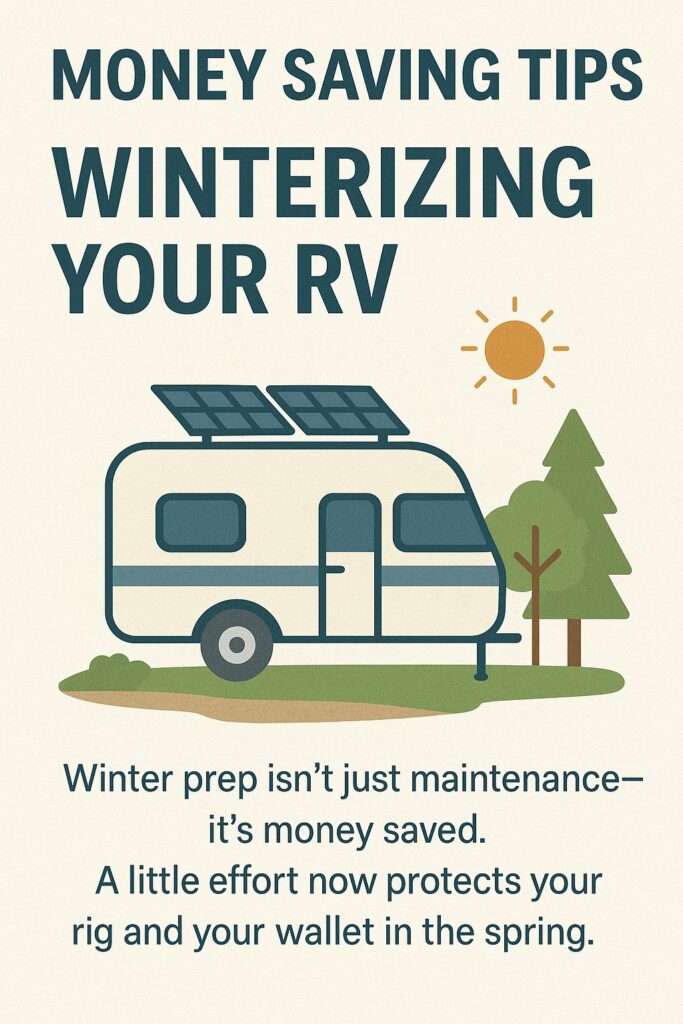 Welcome back to the show, and our segment on Money Saving Tips. We all love a good deal, but today we’re talking about a kind of money-saving that might not feel like it at the time: Prepping Your RV for Winter. This isn’t just about preparing for the cold; it’s about protecting your RV and your wallet from a world of financial pain.
Welcome back to the show, and our segment on Money Saving Tips. We all love a good deal, but today we’re talking about a kind of money-saving that might not feel like it at the time: Prepping Your RV for Winter. This isn’t just about preparing for the cold; it’s about protecting your RV and your wallet from a world of financial pain.
Think of winter prep not as a chore, but as an insurance policy that you pay for in time and effort, not in premiums. Spending a few hours and a few dollars now can save you hundreds, if not thousands, of dollars in the spring.
So, how exactly does Prepping Your RV for Winter help you save money? Let’s break it down:
1. Avoiding Catastrophic Plumbing Failure
This is the big one. If you leave even a small amount of water in your pipes or water heater, it will freeze. As it expands, it will burst your lines, crack your fittings, or rupture your water heater tank. A frozen water system can lead to a repair bill that easily runs into the thousands of dollars, not to mention the extensive water damage to your RV’s interior. A couple of gallons of RV antifreeze and an hour of your time is a tiny price to pay to avoid that disaster.
 2. Protecting Your Tires and Wheels
2. Protecting Your Tires and Wheels
RV tires are expensive. If you leave your rig sitting all winter with the full weight on the tires, they can develop flat spots, and the rubber can degrade from sitting on a cold, damp surface. By simply inflating them to maximum pressure, using tire covers, or even getting the weight off them with leveling jacks, you prevent premature wear and extend their life by thousands of miles. That’s money back in your pocket.
3. Preserving Your Exterior
The sun, snow, and rain can do a number on your RV’s exterior. The sun’s UV rays will fade your decals and cause rubber seals around your windows to crack and fail, leading to leaks. A high-quality cover and a fresh coat of sealant on your roof and seams can protect your rig from all of that. What’s more expensive—a hundred-dollar tube of sealant or a multi-thousand-dollar repair for water rot and mold? The answer is easy.
4. Saving Your Batteries
A lead-acid battery left uncharged in a cold environment will lose its charge and can freeze, completely ruining it. A new battery can cost anywhere from $150 to $400. Simply disconnecting your batteries and bringing them inside using a trickle charger over the winter ensures they are ready to go in the spring, saving you the expense of a replacement.
5. Preventing Pest Damage
Rodents love a warm place to hide from the cold. They can chew through electrical wiring, hoses, and insulation, creating a mess that can be incredibly expensive and time-consuming to fix. Taking a few minutes to seal off any openings with steel wool and placing some pest deterrents inside your rig can prevent thousands of dollars of damage.
Host: So, when you look at it that way, Prepping Your RV for Winter is just a part of the RV lifestyle; it’s a smart financial decision. It’s about being proactive, not reactive. It’s about spending a little time and a little money now so you don’t have to spend a lot of money on unexpected repairs later.
This is the essence of being a Smart RVer.
